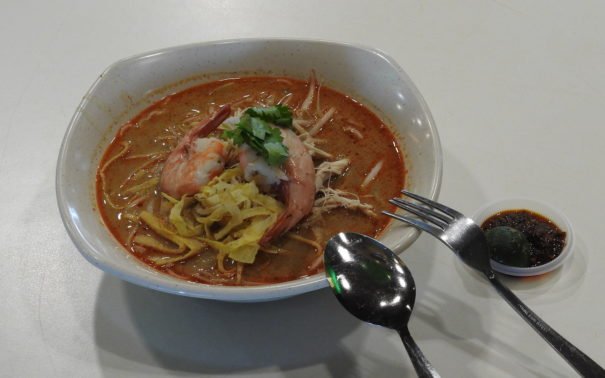
The Laksa Origin Debate, Borneo Edition

The Laksa Origin Debate, Borneo Edition
Laksa in Sarawak
I had done a bit of research about Sarawak laksa before arriving. Not that I was any the wiser. Depending on who you believe, the most authentic pastes have 20, 30, 36 or even more components, among them garlic and lemongrass, as well as various spices.
It’s often said the first laksa vendor in Sarawak—a Malaysian state on the northwest coast of Borneo—was a Cantonese man who moved to Kuching from Indonesia at the end of World War II. He gave or sold his recipe to a Cantonese lady, who may or may not have passed it to a Mr. Tan who, in the 1960s, made a fortune selling factory-made “Swallow” brand laksa paste. None of these creation myths mention the other forms of laksa eaten in Malaysia and Indonesia.
Mr. Tan’s product—and those of the imitators which soon appeared (one called itself “Eagle,” another “Parrot”)—made preparing laksa at home a great deal quicker and less laborious. Inevitably, it was a huge hit among Sarawakians living far from their home state.
I had done less research about politics. But it seems many in Sarawak are unhappy with their place in the Malaysian federation. A common complaint is that the tax dollars spent in Sarawak are tightly controlled by the authorities in “KL” (Kuala Lumpur, the capital of Malaysia), and that the Sarawakians themselves aren’t always consulted. A former chief minister has said the relationship should be rebalanced, so the 2.6 million people in Sarawak can feel like partners in the national project, rather than servants of “West Malaysian colonialists.”
I knew nothing about any of this before arriving. But after a few days of reading the English-language Borneo Post (in which many articles referenced “MA63,” the London agreement of 1963 that supposedly guaranteed Sarawak and Sabah considerable autonomy within Malaysia), and asking questions so lopsided I was sure to get a response (“What would Sarawak do without all those subsidies from KL?”), the resentment was clear.
Still, few Sarawakians want full independence. But if they did break away, they agree at least that laksa would be their national dish.
Between our first morning in Kuching and the day we flew out, we sampled laksa whenever we were in the mood, which is to say almost every day.
Every serving seemed authentically sour yet creamy, and each bowl was deeply satisfying. Just enough rice noodles, just enough shredded chicken, and just enough of the omelet strips. Some bean sprouts here, a few leafy greens there. Two prawns laid head-to-tail, like the Taoist yin-yang symbol. Even the very last bowl, served by bored caterers under hospital-style lighting in Kuching’s little airport, went down a treat.